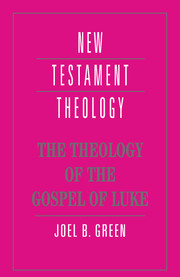Book contents
- Frontmatter
- Contents
- Editor's preface
- Preface
- List of abbreviations
- 1 “In the days of King Herod of Judea”: the world of Luke's Gospel
- 2 “God my Savior”: the purpose of God in Luke's Gospel
- 3 “A Savior, who is the Messiah, the Lord”: Jesus, John, and the Jewish people
- 4 “To proclaim good news to the poor”: mission and salvation
- 5 “Let them take up the cross daily”: the way of discipleship
- 6 “That you may know the truth”: Luke's Gospel in the church
- Further reading
- Index of biblical texts
- Index of modern authors
- Index of subjects
1 - “In the days of King Herod of Judea”: the world of Luke's Gospel
Published online by Cambridge University Press: 05 June 2012
- Frontmatter
- Contents
- Editor's preface
- Preface
- List of abbreviations
- 1 “In the days of King Herod of Judea”: the world of Luke's Gospel
- 2 “God my Savior”: the purpose of God in Luke's Gospel
- 3 “A Savior, who is the Messiah, the Lord”: Jesus, John, and the Jewish people
- 4 “To proclaim good news to the poor”: mission and salvation
- 5 “Let them take up the cross daily”: the way of discipleship
- 6 “That you may know the truth”: Luke's Gospel in the church
- Further reading
- Index of biblical texts
- Index of modern authors
- Index of subjects
Summary
Of the Song of Mary (Luke 1:46–55) the poet Thomas John Carlisle writes,
At our eternal peril we choose to ignore the thunder and the tenor of her song, its revolutionary beat.
In doing so, Carlisle, perhaps paradoxically, brings to the foreground a distressing enigma. At least in this century readers of the Gospel of Luke have ignored “the thunder and tenor of her song.’ Or rather, more often than not, we have wrapped it in antiseptic dress, spiritualized it, projected its message of redemption-by-social-transformation into the eschaton. More often than not, the Song of Mary has been the focus of tradition-historical investigation: who first wrote it? From what community did it derive? In what form did it come to Luke? Mary's Song has not often been read as integral to the narrative of Luke's Gospel, as integral to Luke's narrative theology, as deriving its meaning in this narrative co-text and thus from the larger theological program of the Third Evangelist. The same may be said of numerous other texts unique to Luke's Gospel: the Parable of the Good Samaritan, the Parable of the Prodigal Son, Jesus' words of forgiveness from the cross, and so on.
The study of the Song of Mary in this century is a paradigm of the study of the Third Gospel more generally. Only since World War II has the prospect of Luke as theologian begun to be taken with seriousness.
- Type
- Chapter
- Information
- The Theology of the Gospel of Luke , pp. 1 - 21Publisher: Cambridge University PressPrint publication year: 1995



